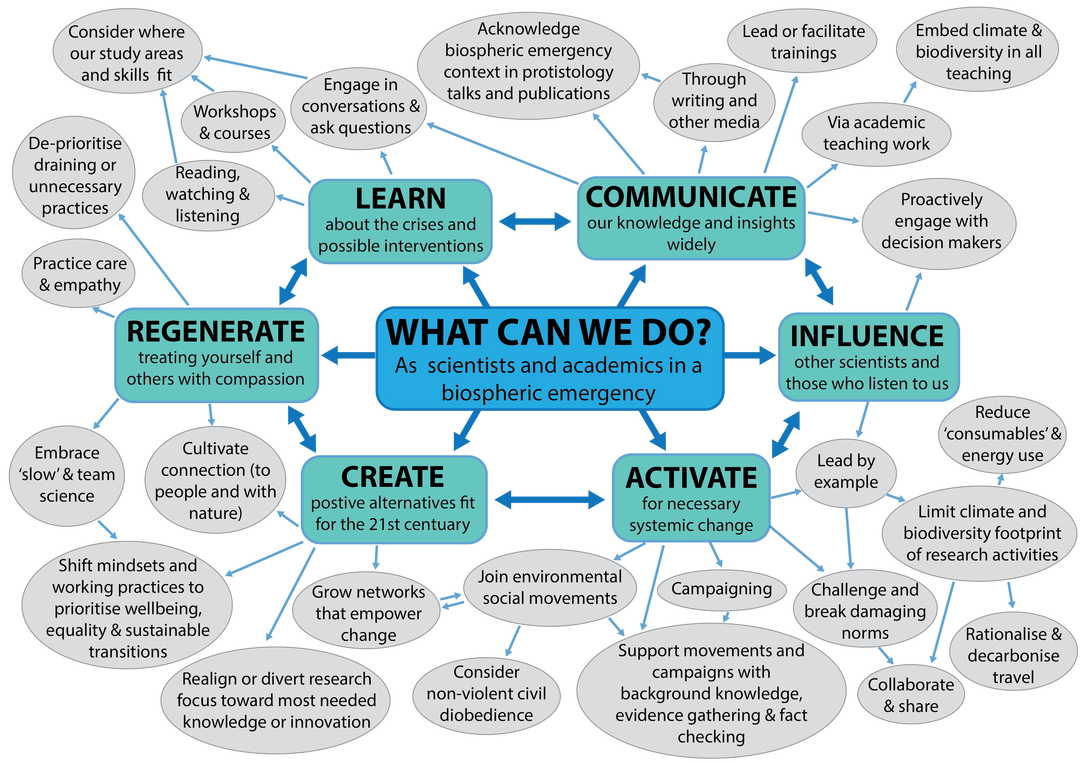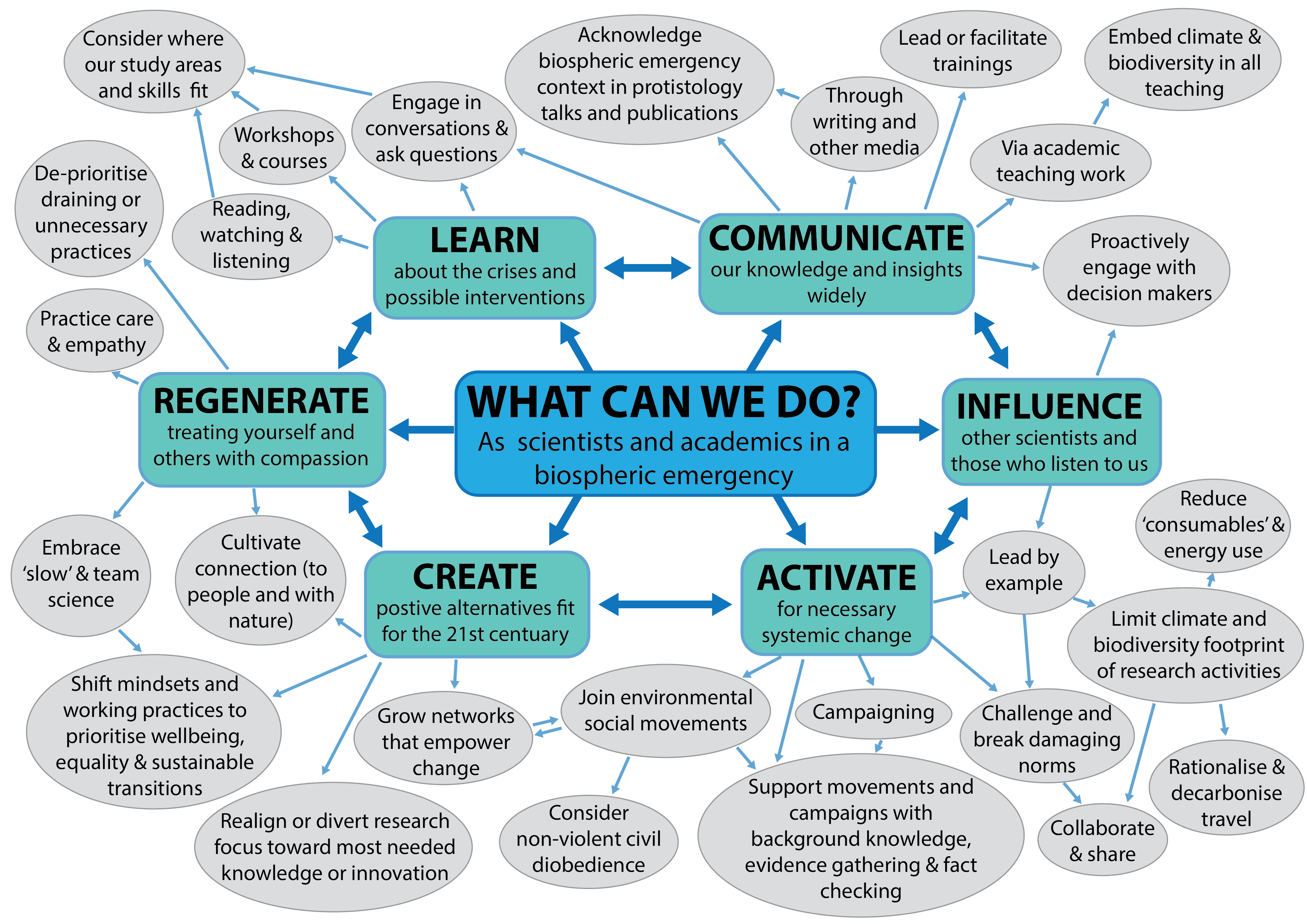- Published on
Scientists! What can we do?
As we face an escalating planetary crisis in a “post-truth” era, how can scientists be most effective in informing and accelerating positive transformations?
If you’re a scientist reading this post there is a good chance that you are deeply worried about the unfolding impacts of climate and ecological breakdown. There's also a good chance that you feel a sense of powerlessness: maybe you don’t know what to do about it, or believe that nothing you do will make a difference? If this is you, you’re not alone. I know this anecdotally - scientists express these difficult feelings to me regularly - but also empirically; in an era where the scientific consensus is clear that humans are continuing to drive existential threats to our only home, scientists themselves report overwork, fear of personal and professional consequences and a perceived lack of support as major barriers to engaging in the types of action they want to be part of.* Just a few years ago, I was thinking and feeling all of the above. But now I know that these barriers to action can be overcome, and that doing so can bring us motivation, empowerment, community and hope.
Driven by the question of what a scientist’s role could or should be in an imperrilled world where our warnings and evidence are so often ignored or dismissed, the past few years have led me to protests, to parliament, and ultimately to parting ways with a research career I truly loved (more on this here). Along the way I have learned so much from so many brave, compassionate and perceptive scientists and change-makers. In this post I’d like to share two insights this has brought me to: why scientists have so much power to make a difference, and the many ways we can use that power effectively.
The "why"...
Scientists, as well as academics more broadly, are in a strong position to accelerate transitions needed to protect nature, mitigate global heating and adapt to a changing world. Here are some of the reasons why:
- We have valuable skills in understanding, distilling and communicating complex concepts. Converting data and evidence into simpler, more usable outputs is precisely what many of us have been trained to do throughout our careers. Whatever our discipline, we can draw on these foundations in cultivating our own and others’ knowledge about climate, nature and effective Emergency action.
- Scientists are still trusted messengers. Amidst alarming trends towards science, experts and even truth itself being undermined and dismissed, trust in scientists remains high around the world, with most agreeing that scientists should be more actively engaged and policymaking and wider society. Public trust in scientists also means that when we take action as part of environmental social movements, we can help challenge pervasive, inaccurate stereotypes about who cares and who is involved.
- Scientists can have greater public reach and access to media than many other groups do, as a result of our networks, perceived legitimacy and (in circumstances such as being a visible presence at a protest) novelty.
- Scientist solidarity is powerful and necessary. Scientists working on climate and biodiversity have been sounding the alarm for decades, yet those warnings have not translated into proportionately urgent action. The more of us there are acting in line with the findings of the scientific community, the more likely we are to have our warnings widely heard, taken seriously and acted upon. Conversely, acting as passive bystanders risks undermining scientists' calls for necessary, transformative action.
- We all have a personal investment in there being a habitable Earth for ourselves and future generations. Additionally, for scientists' work to make a positive difference to people and other species, there is a fundamental need to protect the climate, ecological and societal systems that make it possible: there is “no research on a dead planet”.
Given all of these reasons (and more), do scientists have greater responsibility to push for change? Albert Einstein, whose image has come to symbolise “scientist” to many, is often quoted as saying, "Those who have the privilege to know have the duty to act". I’ve come to agree, but would add that stepping into that responsibility isn’t all ‘duty’ and sacrifice. We have so much more to gain from working together to secure the best possible version of our collective future than we all risk losing if we don’t.

How can scientists and academics respond to the Emergency? Here are just some of our tried-and-tested approaches.
...and the "how".
So what can we practically do as scientists facing this escalating Emergency? Our recent research article and accompanying piece out today in The Conversation focus on the many ways scientists can support the social movements pushing for systemic change. Participating in nonviolent protest and being a part of the communities that have formed around this has been a huge part of my own journey, and I would love to see many more scientists benefitting directly from the movements that have informed and empowered my actions to date…but I also appreciate that not everyone is equally able to or safe to participate. What’s most important at this critical moment, is that we each act in the best way we can, and that we support one another to do the same. This will look different for each of us. It’ll be affected by our strengths, our privileges, our relationships, our vulnerabilities and our restrictions. We might be best-positioned to act from within a social movement, in our local or professional communities, via our job(s), from behind a computer, out on the streets or any combination thereof. With this in mind the following is neither prescriptive nor exhaustive - simply six broad areas where we know scientists can make valuable contributions. These draw heavily on the work and ideas of my great friend Dr Charlie Gardner.
- Learn: We can use our skills to better understand the crises, possible interventions and the disparity between political, corporate or institutional rhetoric and the action needed to protect societies and ecosystems.
- Communicate: We can disseminate our knowledge of the Emergency via one-to-one conversations, by leading trainings, seminars or workshops, or through traditional and social media.
- Influence: We can push for meaningful change and action within our workplaces, networks, organisations and democracies. This involves engaging pro-actively with people who have decision-making powers, reevaluating and challenging the ‘status quo’, and leading by example with our choices personally and professionally.
- Activate: Social scientific evidence, as well as historical precedents, show that social movements can have great capacity to catalyse rapid transitions. There’s a huge range of strategies - from traditional campaigning to civil disobedience - where scientists’ positions, skills, expertise, credibility and networks could be invaluable.
- Create the better alternatives: Our knowledge and technical capabilities can be applied to building the resilient, equitable and sustainable systems our times demand. This could involve shifting our professional focus and/or engaging with movements and initiatives outside of our formal roles.
- ‘Regenerate’: The realities of the Emergency are uncomfortable, challenging and frightening. A better outlook is only possible if we collectively acknowledge this, act with compassion and support one another amidst difficult transitions, hardship, grief and uncertainty. Balance, rest, empathy, and community are essential to sustaining action.
Writing earlier this year with an old friend and former university classmate about how algae are changing as our oceans heat and acidify, we concluded that “much like the incredible life we study, the scientific community can - and must - evolve to meet the existential challenges of our age”. We have no time to lose.
* See Wanting to be part of change but feeling overworked and disempowered: Researchers’ perceptions of climate action in UK universities Latter et al, 2024, PLoS Climate (open access) & Climate change engagement of scientists Dablander et al, 2024, Nature Climate Change. This study is paywalled but a key finding is that the majority of scientists said they wanted to engage in climate advocacy but a minority actually did. Similarly, almost half of the surveyed scientists said they’d be willing to engage in protests and/or nonviolent civil disobedience but a much smaller minority do so in practice.

